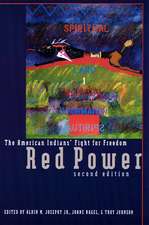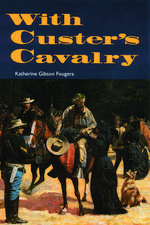Lone Wolf v. Hitchcock: Treaty Rights and Indian Law at the End of the Nineteenth Century: Law in the American West
Autor Blue Clarken Limba Engleză Paperback – 31 oct 1999
Landmark court cases in the history of formal U.S. relations with Indian tribes are Corn Tassel, Standing Bear, Crow Dog, and Lone Wolf. Each exemplifies a problem or a process as the United States defined and codified its politics toward Indians. The importance of the Lone Wolf case of 1903 resides in its enunciation of the "plenary power" doctrine—that the United States could unilaterally act in violation of its own treaties and that Congress could dispose of land recognized by treaty as belonging to individual tribes.
In 1892 the Kiowas and related Comanche and Plains Apache groups were pressured into agreeing to divide their land into allotments under the terms of the Dawes Act of 1887. Lone Wolf, a Kiowa band leader, sued to halt the land division, citing the treaties signed with the United States immediately after the Civil War. In 1902 the case reached the Supreme Court, which found that Congress could overturn the treaties through the doctrine of plenary power.
As he recounts the Lone Wolf case, Clark reaches beyond the legal decision to describe the Kiowa tribe itself and its struggles to cope with Euro-American pressure on its society, attitudes, culture, economic system, and land base. The story of the case therefore also becomes the history of the tribe in the late nineteenth century.
The Lone Wolf case also necessarily becomes a study of the Dawes Allotment Act of 1887 in operation; under the terms of the Dawes Act and successor legislation, almost two-thirds of Indian lands passed out of their hands within a generation. Understanding how this happened in the case of the Kiowa permits a nuanced view of the well-intentioned but ultimately disastrous allotment effort.
As he recounts the Lone Wolf case, Clark reaches beyond the legal decision to describe the Kiowa tribe itself and its struggles to cope with Euro-American pressure on its society, attitudes, culture, economic system, and land base. The story of the case therefore also becomes the history of the tribe in the late nineteenth century.
The Lone Wolf case also necessarily becomes a study of the Dawes Allotment Act of 1887 in operation; under the terms of the Dawes Act and successor legislation, almost two-thirds of Indian lands passed out of their hands within a generation. Understanding how this happened in the case of the Kiowa permits a nuanced view of the well-intentioned but ultimately disastrous allotment effort.
Preț: 146.14 lei
Nou
Puncte Express: 219
Preț estimativ în valută:
27.96€ • 29.29$ • 23.18£
27.96€ • 29.29$ • 23.18£
Carte tipărită la comandă
Livrare economică 08-22 aprilie
Preluare comenzi: 021 569.72.76
Specificații
ISBN-13: 9780803264014
ISBN-10: 0803264011
Pagini: 198
Ilustrații: Illus., maps
Dimensiuni: 152 x 229 x 15 mm
Greutate: 0.32 kg
Editura: Nebraska
Colecția University of Nebraska Press
Seria Law in the American West
Locul publicării:United States
ISBN-10: 0803264011
Pagini: 198
Ilustrații: Illus., maps
Dimensiuni: 152 x 229 x 15 mm
Greutate: 0.32 kg
Editura: Nebraska
Colecția University of Nebraska Press
Seria Law in the American West
Locul publicării:United States
Notă biografică
Blue Clark is a professor of law at Oklahoma City University.
Recenzii
“Fascinating and highly readable . . . This book should be required reading for any student of Federal Indian policy.”—Journal of American Ethnic History
“[Clark] places the Kiowas at center stage in the drama, as prime movers in determining their own fate. In the process, [his] study becomes not only a case study of the Dawes Act in application, but an examination of the Kiowas’ persistent and creative struggle in the late nineteenth century to maintain material, legal, and cultural rights.”—Montana
“Clark’s unique approach in Lone Wolf v. Hitchcock allows him to go beyond the initial examination of legal precedent to reveal a story of human dignity and a people’s survival.”—Great Plains Quarterly
“Blue Clark does an excellent job of placing the decision within the context of its times and setting forth its devastating effect on tribal sovereignty.”—News from Indian Country
“It is a real pleasure to discover a book that places the historical context first and explains the manner in which a particular piece of litigation occurred. Blue Clark’s Lone Wolf v. Hitchcock joins Sidney Harring’s Crow Dog’s Case as a worthy representative of a movement to introduce history into the realms of legal thought.”—Law and History Review



























